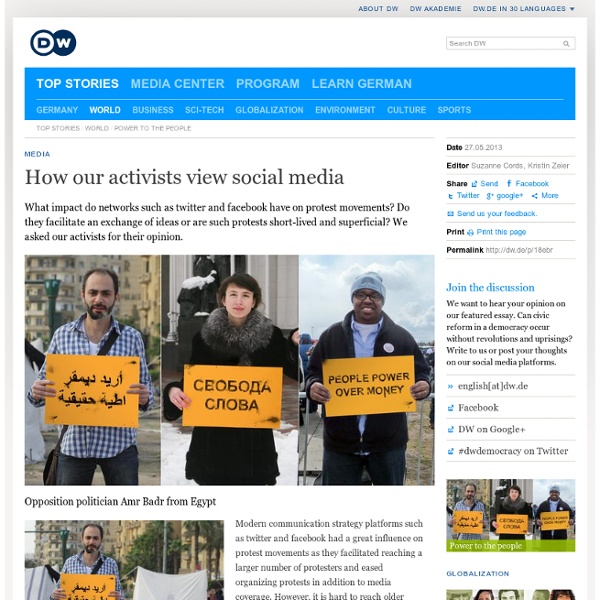Twitter, Facebook, and social activism
At four-thirty in the afternoon on Monday, February 1, 1960, four college students sat down at the lunch counter at the Woolworth’s in downtown Greensboro, North Carolina. They were freshmen at North Carolina A. & T., a black college a mile or so away. “I’d like a cup of coffee, please,” one of the four, Ezell Blair, said to the waitress. “We don’t serve Negroes here,” she replied. The Woolworth’s lunch counter was a long L-shaped bar that could seat sixty-six people, with a standup snack bar at one end. The seats were for whites.
Turkey protests: how activists stay one step ahead with social media
She will receive links to maps only visible to fellow activists that show the location of makeshift clinics in houses and even in restaurants' basements, and can watch live streams of protests on the Ustream service if she is at home. She told the Telegraph: "It has had a massive impact, and if it wasn't for social media we wouldn't have the right information on anything. It's been our saviour." Damla said the use of private group messaging meant activists could "react quickly to check whether we're all safe", and added that if access to Facebook and Twitter was temporarily disrupted, as it has been on each day of the protests, they would merely start communicating through the blogging site Tumblr instead. Protesters became more careful about communicating information privately after they realised police knew where they were, tracking public posts on social media. "We were giving out information to police without realising," Damla said.
Why Social Media Is Reinventing Activism
The argument that social media fosters feel-good clicking rather than actual change began long before Malcolm Gladwell brought it up in the New Yorker — long enough to generate its own derogatory term. “Slacktivism,” as defined by Urban Dictionary, is “the act of participating in obviously pointless activities as an expedient alternative to actually expending effort to fix a problem.” If you only measure donations, social media is no champion. The national chapter of the Red Cross, for instance, has 208,500 “likes” on Facebook, more than 200,000 followers on Twitter, and a thriving blog. But according to the Chronicle of Philanthropy, online donations accounted for just 3.6% of private donations made to the organization in 2009. But social good is a movement still in its infancy.
The Brown Daily Herald: Student Activism Today
By Lauren Schleimer Back in October, when the Occupy Movement was spreading like wildfire, The Herald reported that a majority of Brown faculty members think student activism is lower than when they were in college. Among those working here for more than 20 years, 82.6 percent say activism on campus has decreased.
social activists
The only constant thing is change. The physical, biological and human environments are in a continual state of flux. Individuals react to change in patterns laid down by their society and culture. These patterns change through time.
Famous Activists
Game Show Host, Reality Television Star, Film Actor/Film Actress (1972–) Jenny McCarthy was named Playboy's 1994 Playmate of the Year and hosted MTV's 'Singled Out' from 1995 to… Author, Philanthropist (1811–1896) Harriet Beecher Stowe was an author and social activist best known for her popular anti-slavery novel Uncle… Singer, Songwriter, Activist, Philanthropist (1951–) Bob Geldof is best known as the singer of the band the Boomtown Rats and for his political activism, particularly his…
Andrea Grossman: The Tweet That Forgot to Shake the World
Twitter and other social media should be a driving and powerful force for arts and culture events in L.A, shouldn't it? If it can start a revolution a half a world away, it can bring people to an author event here in southern California. Okay, I'll admit it. The Arab Spring, Occupy and an L.A. literary event are entirely different forces. The Arab Spring magnetized an entire region of the earth's surface, and Occupy disrupted traffic and confounded local government in major cities across our country.
Worldwide social activism demanding change
By Graham Peebles Change is afoot. Confronted with state corruption and corporate greed, abuse of human rights, environmental chaos and extreme levels of economic and social injustice, the people, overwhelmingly the young, are taking to the streets demanding change and a new political/economic system that is inclusive and just.
How to Become an Activist: 12 Steps
Edit Article163,019 views 30 Editors Edited 4 days ago Three Parts:Finding Your MotivationMaking Your Voice HeardBecoming a Leader Activists are people who see the need for change and devote their time to doing something about it. They are driven by passion and a vision for a better future. Activism comes naturally to some, while for others, it's thrust upon them when they experience situations that hurt them or those they love.



